Posts from — March 2010
Felicien Kabuga: The Most Wanted Man in Africa
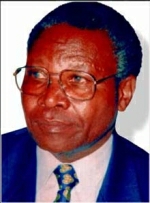
Kabuga: the most wanted man in Africa
Felicien Kabuga
The most wanted man in Africa is accused of being the driving force behind one of the worst genocides in human history.
The International Criminal Tribunal for Rwanda (ICTR) is seeking Kabuga for “serious offences under the 1949 Geneva Conventions, crimes against humanity and genocide,” in connection with the massacre of over 800,000 Rwanda men woman and children in 100 days of terror in 1994.
The rich businessman is accused of bankrolling the Hutu militias that committed the murders. Kabuga owned also the majority of shares in a local radio station (RTLM) which propagated extremist ideology and incited violence against the Tutsi population of Rwanda. He is also accused of having provided weapons, uniforms and transportation that assisted the militias and made massive purchases of machetes and hoes that were used as weapons.
Kabuga fled Rwanda and was believed to be elsewhere in Africa, possibly Kenya.
Rwanda says that they no longer believe Kabuga is in Kenya. (Rwanda says genocide fugitive Kabuga �not in Kenya�).
March 25, 2010 No Comments
Rwanda: Arrest Warrants Issued for Kayumba and Karegeya
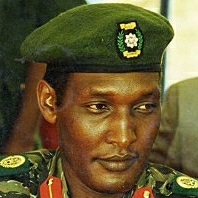
Fugitive Gen Kayumba Nyamwasa
Kigali � A highly placed source in the Prosecutor General’s office has revealed to The New Times that the government has issued international arrest warrants against Lt. Gen. Kayumba Nyamwasa and Patrick Karegeya, who are believed to be behind recent terrorist activities in and around Kigali. The two fled to South Africa.
The source, added that, extradition requests had already been sent to South African authorities. “The charges include terrorism and creating a terror criminal organisation,” the source said. “Interpol has already been alerted.” “We have assured the South Africans that the two fugitives would receive a fair hearing and will be treated in line with international humanitarian law,” the source added.
On February 19, three grenades were hurled at various bus stands around the city, killing two people and wounding 28. Prosecution has confirmed that they have testimonies from several witnesses, who link the attacks to Kayumba and Karegyeya. Kayumba, the former High Commissioner to India, fled the country immediately after the attacks. He passed through Uganda and proceeded to join Karegyeya in South Africa.
Once extradited, the two suspects will be tried in the High Court at First Instance and appeals would be heard by the Supreme Court.
AllAfrica
March 25, 2010 2 Comments
Why Would Rwanda Send Police To Haiti?
The Rwanda New Times reported, on 03.11.2010, that 140 Rwandan Police are undertaking special training to serve as peacekeepers in Haiti. I reported this story for the San Francisco Bay View, National Black Newspaper, on 03.12.2010, http://goo.gl/5rmx, and on KPFA Radio News on 03.15.2010. This is the KPFA Radio News report
Annie Garrison
March 24, 2010 No Comments
Just What Haiti Doesn�t Need: Rwandan Police
by Ann Garrison
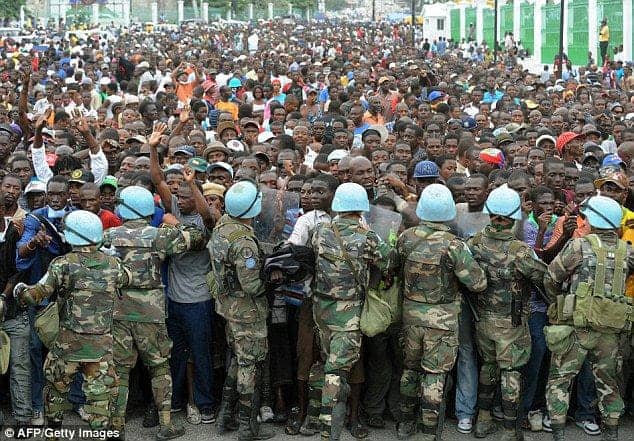
In case anyone needed further evidence that President Paul Kagame�s Rwanda is the Pentagon�s proxy, 140 Rwandan police are about to undertake special training before heading to Haiti, as reported in the Rwanda New Times, because, according to Rwandan Police Chief Eric Kayiranga, �Rwanda wants to be involved in promoting peace in other countries� and, if need be, they would send more peacekeepers to other countries.
Rwanda police are off to Haiti to promote peace, even as:
1) Grenades explode in Kigali in the run up to its 2010 presidential election, and two of three viable parties are still unable to register and field candidates against incumbent President Paul Kagame.
2) A new list of the five most horrible prisons on earth includes Rwanda�s Kigali Gitarama Prison and describes it as the most overcrowded penitentiary in the world, so overcrowded that prisoners have no choice but to stand up all day while their feet rot in filth, often developing gangrene, which may require amputation. (Amnesty International reported, in 2005, that Gitarama Prison was way overcrowded, with 7,477 prisoners in space designed for 3,000.)
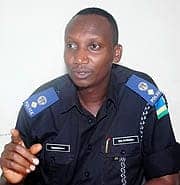
3) Top military commanders and government officials flee the country, and journalists go into hiding to escape arrest.
4) Amnesty International, Human Rights Watch, Reporters Without Borders, the Commonwealth Human Rights Initiative Group, the Africa Faith and Justice Network, the Greens European Free Alliance and Sen. Russ Feingold, chair of the U.S. Senate Subcommittee on Africa, call for human rights, an end to attacks on political opposition, and a free and fair presidential campaign and election, with polls scheduled for Aug. 9, 2010.
And why does Haiti need all these U.S. and U.N. troops and now Rwandan police �peacekeepers�?
Even France accused the U.S. of occupying rather than aiding Haiti, the former jewel of the French empire, but it�s very difficult to interpret this as anything but France�s pseudo moral complaint against its longstanding imperial competitor � England and the Anglophone world � in Africa, Asia and the Caribbean.
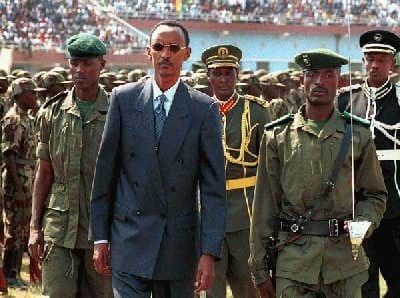
Before the catastrophic Haitian earthquake on Jan. 12, 2010, Haitian lawyer and human rights activist Marguerite Laurent pointed to little known oil reserves and mineral riches to explain the already existing U.N. and U.S. occupation of her homeland, on Salon.com, CKUT Radio and the San Francisco Bay View.
Sound familiar? Where else do Rwandan troops, if not police, serve? Wherever the U.S. wants to project military force in Africa, including resource rich nations, like oil rich Sudan, which the U.S. forever threatens to invade �to stop genocide,� and now resource rich Haiti, which much of the world perceives as a part of Africa as much as a part of the Americas.
And oil and mineral rich D.R. Congo, where the Rwandan Army�s constant invasions and mineral theft in that country�s tortured eastern provinces were finally, in January 2009, officially sanctioned, when the Rwandan Defense Force collaborated with the Congolese Army (FARDC), the Rwandan CNDP militia and U.N. peacekeepers (MONUC) to, so they said, go after the FDLR, the Rwandan Hutu refugee militia. The FDLR is the eternal excuse for military aggression and mineral theft in eastern Congo.
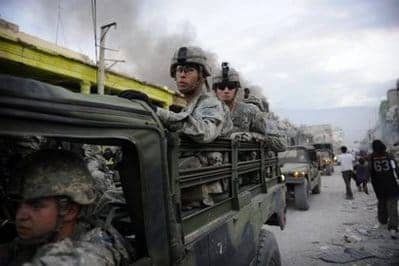
The Congolese FARDC and MONUC had been engaged in a fierce fight with the National Congress for the Defense of the People (CNDP), backed, in stealth, by the Rwandan Defense Force up until Jan. 20, 2009, when they suddenly joined forces, with the blessing and applause of the U.S. State Department and the assistance of AFRICOM, the U.S. Africa Command. Human Rights Watch, in May 2009, predicted that the consequence would be another human catastrophe in eastern Congo and, by December 2009, HRW and major news outlets in the region reported that it had.
This unlikely and unholy alliance emerged in eastern D.R. Congo on Jan. 20, 2009, Barack Obama�s Inauguration Day, and all eyes were on Washington, D.C., the first African American U.S. president, Rev. Rick Warren, celebrities dotting the crowds in the streets and Aretha Franklin�s hat.
But so little of the world heeds or makes sense of sub-Saharan African news that only a handful of bloggers, dissident journalists and scholars noted, on Jan. 20, that D.R. Congo had suddenly become a violent D.R. Disneyland.
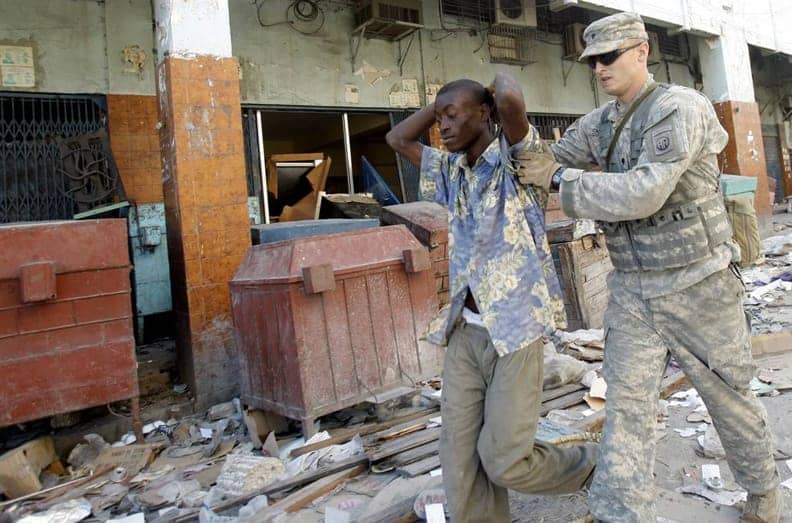
In December 2009, Keith Harmon Snow reported, in Dissident Voice and the San Francisco Bay View, that soldiers of the Rwandan Defense Forces were being flown all the way across D.R. Congo, from its eastern border with Rwanda to its Western border with the Republic of Congo, in oil and timber rich Equateur Province, to join AFRICOM, U.N. peacekeepers (MONUC) and Belgian paratroopers in suppressing the Dongo Rebellion.
Why not Congolese soldiers? Because they lack the discipline of the Pentagon�s Rwandan proxy army and, as Keith Snow reported, many of them were defecting to join the Western Congolese fighters calling themselves the Resistance Patriots of Dongo.
Now, with 140 Rwandan police about to undertake training to serve as peacekeepers in Haiti, the first question is: Why peacekeepers? Didn�t Haiti suffer an earthquake, not a war? And aren�t 10,000 U.S. troops there already?
Why not 140 more Haitian police? Why Rwandans? If Haiti needs �peacekeepers within its own borders,� shouldn�t Haitians be best able to keep the peace in their own homeland?
Yes, but not the peace that those now managing the U.S. occupation of Haiti want.
In February 2007, the New Times reported that the FBI was training Rwandan police in modern interviewing and interrogating techniques and in counter-terrorism, criminal investigation and cyber crimes investigation.
Source: sfbayview.com. First published on Ann Garrison‘s blog.
March 24, 2010 No Comments
Victoire Ingabire Blocked From Leaving Rwanda To �Visit Children�
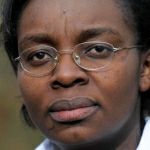
Victoire Ingabire - No subject should be taboe in Rwandan politics
Kigali: Opposition politician Victoire Ingabire Umuhoza was Tuesday evening blocked at the Kigali International Airport as she prepared to leave the country. The police Criminal Investigations Department has also ordered her to report to its headquarters on Wednesday morning.
Police trailed her to the airport and denied her access at 1800hours where she found detectives waiting. She was apparently told by top police detective Tony Kuramba that she cannot leave the country due to an ongoing investigation over several cases, was handed a written summon.
The yet-to-be registered United Democratic Forces Inkingi chief has been left to stay in her home in Kinyinya � an upscale suburb of Kigali. The latest development comes after Ms. Ingabire on Monday directly petitioned President Paul Kagame accusing several government officials and laying out her demands.
Mushikiwabo speaks
Sources say Police detectives pounced on the vocal politician as she reached the airport and had already secured an air ticket. It was not immediately clear where she was heading but says she was going to the Netherlands to visit her children and husband.
Foreign Affairs Minister Louise Mushikiwabo was quick to appear on state radio about 30 minutes later after the incident saying Ms. Ingabire had been refused from exiting the country on the basis of ongoing investigations.
The Police Criminal Investigations Department has summoned Ingabire several times previously on alleged links to Rwandan FDLR rebels; negating the Genocide and controversial comments she made on arrival from exile on January 16 at the Kigali Genocide Memorial Center.
�Usually, somebody does not just leave a country when they are under investigation,� said Minister Mushikiwabo, adding, ��that is the norm even in countries where she lived.�
The Minister said Ms. Ingabire was trying to �skip existing laws� � which prompted the Police to detain her, but also emphasized that the vocal government critic is at her home, not in detention.
However, speculation is rife as to where Ingabire could have been travelling, or why she chose this particular moment to leave the country. Police has now ordered her to report at its headquarters in Kacyiru but no timeline was provided apart from Wednesday.
In the coming days, according to the Minister, the FDU Inkingi chief will �appear before the Police where she will explain her motives�.
Petition to President Kagame
The country�s top diplomat accused Ingabire of behaving like the �country�s laws do not concern her ever since she arrived� from exile � which is why she is under probe. The law apparently requires she gets permission from the authorities before traveling out of the country.
Meanwhile, on Monday, the embattled opposition politician wrote to President Paul Kagame asking him �as the guarantor of the Constitution� to order state institutions to �remain neutral� in handling critics like her.
In a three-page letter, the FDU Inkingi boss among other concerns accuses the Minister of Local Government Mr. James Musoni of �openly� violating the law by verbally refusing her to hold a party conference when she has not been convicted. Ms Ingabire also names Nyarugenge district Mayor Ms. Theophila Nyirahonora who vowed two weeks ago never to allow FDU meetings on her territory as long as its boss still has cases to answer with the authorities.
Ms. Ingabire also says that since FDLR combatants are being enticed to lay down their arms and return home, there was no need to �witch-hunt� her. However, she also tries to distance herself from the group � accused in Kigali of executing the Tutsi Genocide, later fleeing to neighbouring DR Congo.
The FDU Inkingi is also asking the Head of State to use his office to order the relevant institutions to allow it to hold what they describe as a �Constitutional congress in accordance with applicable laws and without any further hindrance from the government.�
�Excellence Mr. President, All the above developments clearly show that the political process without your ultimate intervention and arbitration is derailing,� writes Ingabire, in the open letter, in which she makes six demands.
The Police say there is nothing unusual with Ingabire being blocked from leaving the country. Her travel will depend on the progress of her interrogation on Wednesday, said Police Spokesman Superintendent Eric Kayiranga.
ARI-RNA
March 23, 2010 3 Comments
Rwanda: Army Has Highest HIV Rate Compared To National Average
Kigali: The prevalence of HIV/Aids in both the active and decommissioned military personnel is higher among themselves and their families, than the general population, a study says.
Despite claims by the Rwandan Ministry of Defence that infection rates among soldiers in the Rwandan Army are lower than the general population, the study says, Rwanda follows a typical pattern seen in other countries.
Prevalence was found to be 4 percent compared to the national average of 3%. However, the Police was found to be having the same infection rate as that of the whole country.
The study was released to coincide with a regional conference for Armies and Police agencies from the five East African Community members. Representatives from these agencies are in Kigali for a three-day conference to workout how they can better coordinate their HIV/Aids combat activities.
Findings show that that among RDF soldiers, 87% were below 30 years old and 89% were unmarried. Despite high levels of knowledge of HIV/AIDS and STDs, 18% interviewed reported having at least two sexual partners.
The kind of security forces do which involves moving having no stable place base is another element that influences they higher rates of prevalence, according to the findings.
A working paper for the conference detailing the five-year EAC strategic plan on HIV says military conflicts in the region have increased the risk of vulnerability to HIV infection.
Launching the conference Monday, Rwanda Defense Minister Gen. Marcel Gatsinzi called for combined efforts from the regional forces to fight HIV.
The Rwanda army enforces mandatory testing upon recruitment and seropositive candidates are not accepted. However, soldiers who are infected while in service receive free medical treatment and officially HIV positive soldiers are not decommissioned.
ARI- RNA
March 23, 2010 No Comments
Why I Do Fear For Rwanda
Depending on how you look at it, Rwanda is a country in chaos. That is of course if like me, you define chaos to mean a state lacking order or predictability. The establishment in Kigali knows this but accepting it is a parody.
President Paul Kagame, the powerful aristocrat who we now know will win the August 2010 presidential election for yet another seven-year term knows this. His henchmen know this as well. They of course won�t tell you now but soon you will know because the writing is on the wall.
For 16 years, Kagame and his Rwanda Patriotic Front (RPF) have tried and successfully developed the country. The economy is booming, buoyed by constant aid from Western countries. Unity and reconciliation have become the ruling government�s catchphrases. For over 10 years, the government has drummed these two in the minds of Rwandese with the belief that one day, people will forgive and forget. Whether this has been successful, no one can realistically tell. It is a case that I will leave for another day.
What I do know is that Rwanda today, is a nation threatened not by a rampant genocide, but the side effects, of it.
For any nation, race or creed, history is important. It is through knowing one�s history that focus is derived. However, there is a marked difference between using this history for the better and using it to one�s advantage. Explaining this phenomenon in relation to Rwanda, is as hard as explaining the chaos theory itself.
Chaos Theorist will have you believe that when a butterfly flaps its wings on the North coast of Africa, there is going to be a monsoon in Uganda. Strange as it may seem, this is predictable and sometimes, it has happened. While science tries to explain such behaviour through the analysis of a chaotic mathematical model, politics does not. What politics does is give you the opportunity to see and predict.
The idea, that a government should tightly guard against public rallying, suppress and stifle its population out of the basic freedoms like association, speech and press, all in the name of avoiding a repugnant history is one that I struggle to understand. History has shown that people will always move on, whatever the circumstances, as long as the issues that matter to them, are duly resolved and addressed.
If as a pastor, I spent 17 years preaching to my congregation to turn to God and they looked like they never care after those years, I certainly would consider doing something else. Either, my preaching is bad or am not the best man for the job. It is not a formula; it is simply, how things are done.
From the day Rwanda announced it was going multiparty, something seemed odd. The question on many people�s minds was, how do you effectively go multi-party with a society like Rwanda�s and at the same time avoid harming the basic fundamental human rights?
From the word go, Kagame�s government was torn between letting go and effectively crushing dissent. But because they had to appear all encompassing, they opted for accommodative politics. First Faustin Twagiramungu became Prime Minister, Pasteur Bizimungu was made president. A host of other names who many would have doubted to feature in the RPF government made it to the A-list. The idea was to look accommodating while laying the foundation for a successful real RPF take over. Behind the scenes of Bizimungu�s presidency was a powerful general called Paul Kagame. To accommodate his ego, Rwanda had to even go against its constitutional provisions and create the post of Vice President, which mind you had never existed before and does not exist anymore.
As pressure mounted on Bizimungu to rule as he was being asked to, Rwanda�s strong man saw an opening. Bizimungu was implicated in a corruption case, accused of inciting violence and promoting divisionism through his Ubuyanja Party and later, jailed.
I was there in 2007 when Pasteur Bizimungu stepped out of Kigali�s 1930 Central Prison. I like all present journalists tried hard to get to speak to him in vain. Not even were we allowed to take pictures of him coming out of the prison doors! Why deny journalists a chance to get an action picture of a former president stepping out of a prison where he could very easily have spent the rest of his life?
But that is not the point. Bizimungu was rushed into the prison chief�s main office where he was debriefed by then Internal Security minister Musa Fazil Harelimana. He only spoke to express his gratitude to president Kagame for the presidential pardon and quickly claimed he was too tired and in need of rest. He was whisked away in a waiting white Land Rover and no one has heard from him since. Is he happy, well and free? I will get back to this.
Four years later, life goes on. Rwanda is still the same country. A nation on course of a well treaded development path, some will argue. The locals still go on about their usual business and poor women are still fighting running battles with police and local defence personnel in the city centre as they (poor women) try to sell fruits and vegetables to make ends meet. Rwanda continues to get aid cash but poverty levels are still the same. More than 60 percent of the population, according to the UN, are still illiterate. Spells chaos? I don�t think so. Just predictable.
Reading the other day that Bernard Ntaganda, the leader of the PS- Imberakuri, had been ousted as party leader, made me think of two things. Who is Ntaganda and why the fuss about him? Mr. Ntaganda, Kigali has made us believe, is an accomplice in the recent bomb attacks in the country�s capital. He has previously, government claims, met with Deo Mushayidi (the gentleman being held over the grenade attacks) and therefore, predictably, was a dangerous fellow.
Now, unless you are a student of mathematics, any one with a notion of what politics is all about will know that Ntaganda, as leader of a registered political party which did not necessarily subscribe to the values or the ruling RPF was bound by circumstances to be meeting with other political parties or members of the opposition. It is normal. Even America�s top leadership was in the days after Sept 11, reported to have met with the country�s enemy number one, Osama bin Laden.
While this does not suffice in condoning the association of Ntaganda and Mushayidi � if at all there is one � it should be no reason whatsoever to force a resignation and persecution of a leader of the only registered political party so far, that has expressed interest in contesting the August presidential election. What it does prove however, is that in Rwanda, the presumption of innocence exists only in theory. In Rwanda, a suspect is an outright criminal unless of course that suspect is a beloved government official and the arrest warrant from France or Spain.
It is very easy to have predicted from the events leading to Ntaganda�s disappearance that his political future was already cut out. With Victoire Ingabire, the FDU-Inkingi party leader and Frank Habineza of the Democratic Green Party of Rwanda all fighting for their registration and having to put up with all sorts of intimidation from authorities, what was easily predictable is that in the event of a total failure to register, the two promising parties, would then most likely back PS-Imberakuri�s Ntaganda. And Kigali was not about to take a gamble on him, he had to be framed. Kagame is fine with Christine Mukabunane because unlike her predecessor, she is less known and will heed to RPF�s political pressure more easily unlike Ntaganda.
The notion of predictability even comes further into fore when one considers the recent events in Kigali regarding an FDU-Inkingi party delegates meeting that was meant to take place on March 13. Kagame is a keen political strategist. He made a mistake underestimating the strength of Victoire Ingabire when she arrived in Rwanda from Netherlands by letting her in. She has since risen as a force to reckon with. No wonder Kagame�s government using the police force, survivors associations and rogue writers in government publications has ben involved in a tarnishing campaign against her.
The police case against Ingabire will drag on and on until well August. During this time, Ingabire cannot hold a party conference, hold a meeting or even get her party registered. That is more like mission accomplished for then Kagame can go unopposed or if indeed someone comes out to stand against him it will be some stooge with a very compromised ideology. The West will pass the elections as having been democratic despite a few hurdles and complaints, and Kagame the dictator, will get another cool seven year mandate. As for Ingabire, the government is now going to keep insisting, sorry we cant help or allow you hold a conference because you are a subject of a police investigation. Ridiculous but effective!
This is even hopeless if you consider that the same government a year ago, bitterly complained when Spanish and French judges issued arrest warrants to members of the regime in Kigali. But that is not chaos, it is what should be but sadly, never gets predicted. It is a case of �Kyenkola Banange Sagala Bakinkole�. The West wont even squeak because as long as the dictator in question belongs to the good dictators, everything should be just about ok.
If division-ism or inciting violence is the case that Ingabire is being accused of, or if associating with FDLR is what is making her go through all the delays, the government should come clean here and expedite her trial. If it can�t, they should clear her name and allow her register FDU-Inkingi.
A friend of mine Keith Harmon Snow the other day leaked a secret document from the Rwandan Ministry of Foreign Affairs detailing names of Kigali critics both foreign and national to be eliminated. It gives a clear picture of what Kagame�s government is all about. Question is, why plot the assassination of your critics if you know everything is in tune?
Murder they will but the idea that by killing Keith, Annie Garrison, Rusesabagina and a few others will eliminate criticism is equivalent to believing the impossible. What Kagame should do is be fair to all and address the underlying issues that have so long characterised fall outs between him, old friends and all those under his leadership.
And yes, the Rwanda Media Fraternity has disowned Godwin Agaba. This is what amuses me. First the association of Rwanda journalists claims Agaba is not and has never been a journalist. Then suddenly they publish a story in The New Times that he has been disowned by them. How is possible to disown someone who has never been part of you?
Unless disowning means something else other than to refuse to acknowledge or accept as ones own. Agaba has and will always be a Rwandan journalist. Am glad to hear he is safe and sound wherever he is. I can only wish him the best of luck.
According to The New Times, March 18, Umuseso, a Kinyarwanda newspaper published a photograph of Agaba Godwin in its December 31, 2006 to January 6, 2007 issue, warning the public not to transact any business with him on their behalf. In the same message, it was indicated that Godwin Agaba had been sacked for extortion and warned that he was still masquerading as their employee.
Then in in 2007, (exactly 6 days after Agaba�s photo had appeared in Umuseso newspaper as alleged) Agaba joined The New Times newspaper. Give me a break. Why would The New Times want to hire a thief and an extortionist whose picture had been flashed on the front page of a rival newspaper unless they trusted him or wanted something out of him?
Over to you my little monsters!
Eleneus Akanga – ellyakanga.wordpress.com
March 23, 2010 No Comments
FDLR Leader Turns To UN For Repatriation From DRC
The head of a dissident faction of Rwandan Hutu rebels in the eastern Democratic Republic of Congo has handed himself to the UN mission for repatriation to Rwanda, the UN said Monday.
Colonel Ngoboka Rashidi, 41, arrived at the UN offices in the city of Goma on Thursday, mission spokesman Madnodje Mounoubai told AFP, confirming a report on the UN-sponsored Radio Okapi but giving no details.
Rashidi, head of a breakaway faction of the militant Democratic Forces for the Liberation of Rwanda (FDLR), was accompanied by six bodyguards and a dozen members of his family, the radio said.
“I return to my country to contribute (to its) development, to help my family,” he said in the radio report. “I am ready to serve my country because there is no longer any reason to fight against the regime in Kigali,” he said.
He was to be repatriated to Rwanda on Monday.
The colonel arrived from Lubero in Nord-Kivu province where he led the Rally for the Unity and Democracy (RUD), the radio report said.
RUD, created in 2006, had close to 400 fighters in January 2009, according to the UN mission in the Democratic Republic of Congo (MONUC).
The Congolese army, supported by MONUC, has since January been leading a major operation against the FDLR in Nord-Kivu and Sud-Kivu provinces.
Since 2002 MONUC has, under a disarmament programme, assured the voluntary repatriation of foreign fighters and their dependants who are based in the DR Congo.
AFP
March 23, 2010 No Comments
New Rwandan Coffee Blend Released On US Market
Kigali: After blends sold by American coffee chain Starbucks, a separate joint initiative announced Monday that it was launching the Spring Revival(TM) Blend � made from coffee bought from two cooperatives in Northern Rwanda.
The Spring Revival(TM) Blend will be available in 10-ounce bags, 2.2 ounce fractional packages, and K-Cup(R) portion packs for Keurig (R) Single-Cup Brewers from June 4, 2010. Buyers will also be able to get the new blend online.
The blend is the result of a partnership between Green Mountain Coffee, the Cordes Foundation, and TransFair USA – the leading third-party agency to certify Fair Trade products in the United States.
The partnership described the new coffee as �a seasonal blend that offers sweet aromas, balanced flavors and a compelling story of hope.�
The joint Clinton Global Initiative commitment of the Cordes Foundation, TransFair USA, and Green Mountain Coffee–valued at $250,000–is helping the Rwanda farming cooperatives KOAKAKA and ABAKUNDAKAWA build thriving international coffee enterprises and market their products directly to the largest consumer market in the world–the United States.
Global coffee giant Starbucks has developed its own blends from Rwanda across its stores including the Rwanda Blue Bourbon Coffee and Starbucks Rwanda Blend.
ARI-RNA
March 22, 2010 1 Comment
Bikes for Rwanda: Project Rwanda Initiative
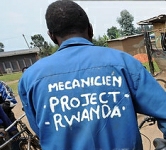
Project Rwanda, founded by Tom Ritchey, believes that bicycle can be an important tool in rebuilding a country and building national pride.
Project Rwanda was founded by Tom Ritchey after he visited Rwanda in 2005, out of his passion for cycling, a love of Rwanda�s natural beauty, and the inspiring stories of hope of the Rwandan people. Tom�s trip resulted in a realization that the bicycle can be an important tool in rebuilding a country, building national pride and addressing local issues facing Rwanda and other African nations.
Project Rwanda currently operates with a small group of like minded Board members who all donate their time and energy to the project. Donations are primarily used to support actual projects, with only a small portion going toward the occasional need for temporary help with clerical and graphic design functions. We estimate currently that 90% of donations are used in support of actual projects. Project Rwanda has no permanent salaried staff, offices or vehicles and utilizes other agencies� staff on the ground in Rwanda to assist with the local support of our projects.
Project Rwanda Mission Statement
Project Rwanda is committed to furthering the economic development of Rwanda through initiatives based on the bicycle as a tool and symbol of hope. Our goal is use the bike to help boost the Rwandan economy as well as re-brand Rwanda as a beautiful and safe place to do business and visit freely.
Project Categories
1. Build Awareness for Rwanda:
Increase awareness for Rwanda, the country and its people, as a tourism and cycling destination, through the development of an eco�tourism industry: annually (September �06 was 1st event) conduct a multi�day event attended by Rwanda�s, US and European riders to promote this concept.
2. Special Bike Designs:
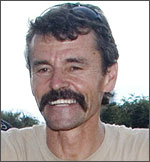
Tom Ritchey, Founder of Project Rwanda.
Project Rwanda is actively engaged in the design, development and consults with implementation of special use bicycles to address specific needs within the country. Project Rwanda locates a foreign vendor to manufacture these bikes cost effectively for export to Rwanda (Landed cost approximately $100 � $200). In this role PR serves as a facilitator, consultant, designer and advisor regarding the entire scope of the project. A collaborating agency actual funds the purchase, delivery and distribution of the bikes. The first undertaking is for 2,000 special hauling long bikes for use by coffee farmers to haul their crop to the washing station collection point more quickly which increases the price they receive for the coffee cherries as this is a very time sensitive step. This project is in conjunction with the Texas A & M University and their Rwanda management team, USAID/SPREAD, which funded the actual cost of the bikes.
3. Bike Distribution:
Project Rwanda plans to establish bike distribution to needed organizations that do not have existing grants to purchase bikes. This program is under development and will involve a �hand up�, not a �hand out� through a micro financing mechanism which subsidizes the cost of purchasing the bike and provides micro financing locally but requires repayment of a percentage of the bike cost over a period of time at low interest rates. It is envisioned that this micro financing mechanism, once established, will be rolled out to other African nations and non African developing nations. The need for special use bikes worldwide is estimated to be in the hundreds of millions; the bike is an affordable, practical, environmentally friendly solution to local transportation and hauling needs.
4. National Pride:
Select, coach, train, equip and promote a Rwandan National Cycling Team with the goal of successful participation in International Cycling competition as a means of promoting this industry within Rwanda and providing increasing awareness and national pride for Rwanda internationally.
Project Rwanda – http://projectrwanda.org/
March 22, 2010 No Comments

